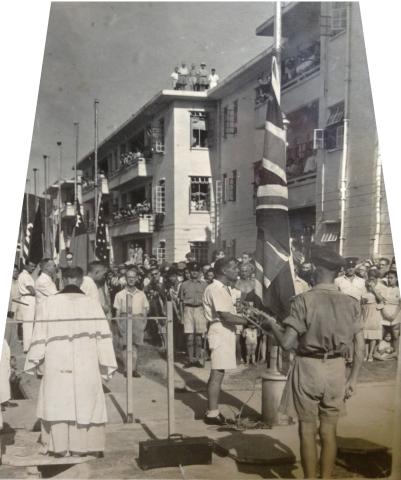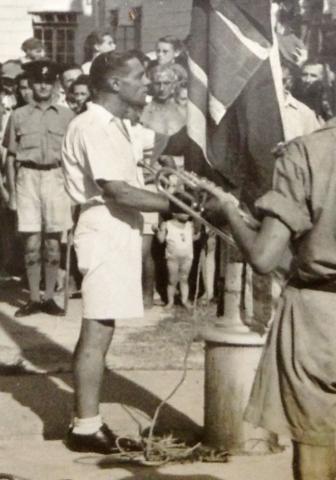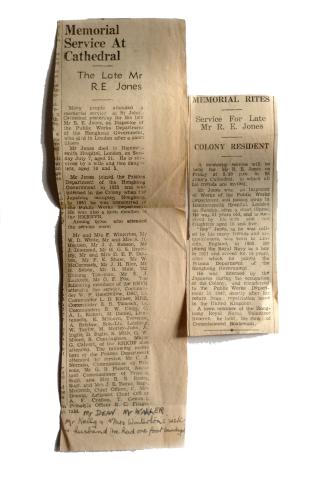Exciting news this week – we’ve heard from Rae, daughter of R E Jones. She has just read her father’s wartime diary [1] for the first time, having always believed it was destroyed in 1945.
Background
The diary starts at the end of 1940, when Jones was working as a prison officer in Stanley Prison. He often mentions his wife, Marjorie, who’d been evacuated to Australia, and his young daughter Rae. Rae had been born in Australia, so Jones hadn’t met her yet. A year later, events take a dramatic turn with the Japanese invasion of Hong Kong, and Jones taking part in the fighting at Stanley. He survives, and begins the long internment at Stanley Camp.
Jones isn’t physically hurt in any way during his internment – no beatings or torture as far as we can tell. But he has other hardships to bear. In the second half of 1942, his diaries record a close relationship developing with a lady he records by the initial G [2]. However she has doubts about whether her husband was killed in the fighting or not. Around Christmas time she breaks off the relationship, but Jones mentions her daily in his diaries, up until she leaves the camp, repatriated in 1943.
Jones diary continues with records of routine daily life for the next couple of years, until in 1945 a new relationship develops. She is also initial G for most entries, though he once mentions her as Gwen [3]. After liberation, he begins the journey home to Britain, but with frequent mentions of Gwen, and also of his wife Marjorie who by then is back in Britain waiting to meet him. The diary ends with his arrival in Liverpool on 27th October, 1945.
You can’t finish the diary without wondering “What happened next?”
Diary
The diary only surfaced recently, after being hidden away for over sixty years. The first mention of it in public was this message from Alison McEwan, posted on 21st April, 2010 [4]:
I’ve recently started transcribing a diary in my family’s possession [...]
How my father Colin McEwan came by it we don’t know, but it turned up as we slowly went through my parents’ books.
It is a hardbacked notebook written in pencil from 28th Dec 1940 thro’ to 27th Oct 1945. […]
I have only reached early September 1942 but already I have references to a tiger and just today, $5 from the Pope.
[…] I would dearly love to locate Rae Jones or her family so they could recover this piece of history.
Despite the efforts of several people, it was not possible to trace Rae’s whereabouts.
Then last year, I started posting daily entries from the diary as part of the “70 years ago” wartime diaries project [5]. His is the most consistent diary we have, with an entry for nearly every day of the internment.
I also hoped we’d hear from someone in Jones’ family, possibly Rae, or even someone from the next generation. I hoped it would be Rae, but was also unsure whether the news of her father’s relationships during internment would come as a shock.
Rae gets in touch
Then last Friday this comment appeared on Gwulo, with a request to get in touch:
I am Rae. The eldest daughter of Raymond Eric Jones. I have only today discovered this site and news of my father’s diaries.
I wrote to Rae immediately, attaching the typed copy of the diary that Alison had prepared.
Over to Rae:
What happened next?
When my father arrived back in the UK we met as a family for the first time at the home of friends of my mother in Lincoln. We then stayed with my grandfather in Skegness until my father was passed fit to return to Hong Kong.
It was during this time that G sent my father a gift of a rather splendid atlas (which I still have) together with a letter in which she told him he should remain with the wife with whom he had spent so little time and with the daughter he had not met until now. My sister and have often talked about G (not even knowing her name) wondering who she was and what had happened to her. Her decision had such an affect on our lives. My sister (born after the war) and her lovely family would not have existed!
How deeply he loved G I can only surmise. I've read the diary now and know he was in a quandary about the future. However, he still appeared to care for “Marj darling”!
My mother read the letter and then the diary and in heartbreak mode destroyed their wedding photos, all their letters and the diary. However, we now know the diary survived and I can only believe that my father offered to carry out the destruction but instead sent it to someone for safekeeping. Perhaps to Steve ((E J Stevens [6])) with whom he appeared to be so close during his internment. He was a prison officer also I believe. Alison has told me her father was in charge of Stanley Prison for a short time after the war. Perhaps the diary was handed to him for safekeeping. Steve is not someone I recollect when I was in Hong Kong.
My mother often expressed her sorrow at the loss of the diary. She told me it was such a detailed record of camp life. She was such an understanding person and accepted that liaisons were formed under these circumstances. It was my father who couldn't forget.
Back in Hong Kong, my father returned to Stanley Prison as a prison officer but very soon transferred to the Public Works Department. We moved to Kennedy Road and then to Wongneichong Road. He was a keen Mason and joined the Naval and Military Lodge. He was a keen member of the Hong Kong RNVR and represented them at the RNVR Golden Jubilee parade in the presence of the Queen at Horse Guards Parade on 12th June, 1954.
What effect did internment have on your father?
My father never talked about his time in Stanley camp. There were a few people he refused to socialise with because of their selfish behaviour in camp. This from my mother who never mentioned names because obviously I was at school with their children.
But it’s clear the man I grew up with was not the man who wrote the diary. Something changed him radically and I thought I would find answer in the diary. I suppose what I have found is confirmation that losing G turned him into the silent, morose and impatient man I grew up with.
People in the UK who knew him while he was courting my mother - it took him 4 years to persuade her to marry him and join him in Hong Kong - said he was a charming, loving and witty man who adored Marjorie. A lovely man. They assumed that his treatment by the Japanese was the cause of the change in him. I don't get that impression from his diary. I feel he coped well with internment. Others who were interned with him and were part of our social circle after the war were perfectly normal men who resumed life with their wives and children very happily.
He became a regular drinker, only after work and at weekends. Not an alcoholic and only drank San Miguel. He would call in at the Police Club or the Football Club en route home and get involved and forget to come home. 75 per cent of the time he arrived home too late for dinner. In the diary he mentions having a couple of glasses of wine with Steve and Mary which quickly affected him and remarked that he would have to be careful with alcohol.
How did you find the diary?
I bought myself a mini Ipad and yesterday morning while lying in bed with my morning cup of tea was playing with it and bizarrely googled Rae Marjorie Jones Hong Kong and up popped R E Jones War Diaries. I froze!
As a teenager I vowed that one day I would have heart to heart with my father to try to understand his attitude towards 'Marj darling and baby Rae'. Alas he died in 1957, before I had that opportunity. These diaries are that conversation.
What else should we know about your father?
In the diary he does not mention the fact that he stitched a Union Jack into his mattress and slept on it for the duration of his internment. He was given the honour of raising that flag at Stanley when Hong Kong was liberated. His photograph was on the front pages of the UK papers and was included in the Pathe news reports. I have a copy of that photo hanging on my wall:
The year before HK was handed back to China the Governor of Stanley Jail gave me permission to visit the actual site of the flag raising and a photo of me standing in the exact spot hangs alongside the photo of my father. The flag should have featured in the Hong Kong hand over but alas my mother had it buried with my father in his grave at Skegness.
He also doesn't mention in the diary that our no.1 ah-mah, Ah Yam, known to us as Ga-so, smuggled food into him from time to time during his internment, and was the first person to greet him when he was liberated. She remained with us until we finally left Hong Kong.
He learned to speak, read and write Cantonese. His Chinese staff adored him. One Christmas we received so many live turkeys we could have run a turkey farm and he had to put a stop to their generosity!
My father was born in Lincoln on 8 December 1905. He died in Hammersmith Hospital on 7 July 1957, aged 52. There was a memorial service at St John’s Cathedral in Hong Kong, and I attach copies of reports from the South China Morning Post (click thumbnail for a larger copy):
Do you plan to see the original diaries?
Alison is arranging for the diary to be returned to me. My sister and I would like the opportunity to see the original and share it with our families, before deciding where the most appropriate place is for it to be kept.
Thank you to Alison, and to everyone that has helped put me back in touch with my father’s diary. I’d understood from my mother, who is now dead, that the diaries had been destroyed. I can hardly believe this has happened.
Thanks to Rae for so generously sharing her family’s story with us.
References:
- R E Jones’ wartime diary: http://gwulo.com/node/9660
- G: http://gwulo.com/node/15051
- Gwen: http://gwulo.com/node/16147
- Message posted to the Stanley Camp Discussion Group: http://groups.yahoo.com/group/stanley_camp/message/961
- Subscribe to the 70 years ago project to receive a daily email with diary extracts from 70 years ago today: http://gwulo.com/node/10010
- E J Stevens: http://gwulo.com/node/11744



Comments
What a great story
What a great story, and an incredible stroke of luck. Very pleased for you, Rae. You must be so excited . .and many other emotions too.
best wishes,
Adam
What an amazing and moving
What an amazing and moving story. Thank you for all the extra information about your father.
There's been some discussion/speculation about Mr. Jones online, and it's amusing to think he's been there in front of us all the time, right at the centre of the best-known of all Stanley photos! Presumably the union jack he's raising is the one he'd kept hidden.
BTW, the 'Mr Waller' whose namees been added by hand to the list of attendees at the Memorial Service is presumably my parents' friend Tommy Waller, an engineer on the Peak Tram:
http://gwulo.com/node/11159
Great story
Wow! A great example of the power of the internet to do good. It must make all the hardwork behind putting the diary online worth all the effort. Many congrats to all involved.
re: Great story
Thanks for your comments, which I've forwarded to Rae. I enjoy the facts we gather about places and things, but peoples' own stories are always the best.
Barbara Anslow also commented:
What a truly amazing story! We have to thank Google for directing Rae to the diary on line, Alison for typing it and sending it to the Stanley site, and Rae for generously telling us about her father and family.
Without our Stanley Camp Group, none of this would have come to light.
I don't know who 'Gwen' was, but I did know the first 'G''s little girl Bonnie, referred to in diary as B. She was a red-haired toddler, and I'm sure Mr Jones was thinking of his own little girl Rae when he helped 'G' to look after Bonnie. As Rae says in her email, camp life was very hard on camp 'widowers' whose wives & families were in Australia, and 'widows' whose husbands were in the men's camps in Kowloon or Japan.
So sad that Mr Jones passed away at such an early age.
Regards, David
Thanks
And thanks, of course, also to David for creating and painstakingly hosting the website that brought it all together.
Adam.
R E Jones War Time Diary
Thank you for all your comments and interest in my father's diary and the story of its survival and arrival back to me and my family. I am still breathless at the speed things have happened, how only by a hair's breadth I discovered its existence and the affect it has had on my family. Thank goodness for modern technology and David Bellis. How very fortunate it was discovered by Alison and Tim and their appreciation of its importance.
Rae
R E Jones diary
I have just finished reading the final entry in the R E Jones diary, as well as the follow-up story as told by his daughter Rae. I want to thank you for sharing this story of Mr Jones' life as an internee at Stanley. I was very interested to read about his apparent personality change after the war, as it paralleled that of my own father, who was also a (military) POW in Hong Kong. It was my father's chronic mental health issues, in part, that prompted me to follow these war diaries in the first place, and I do feel I have gained much insight from having done so. Thanks again, to all concerned, for having made these writings available.
re: R E Jones diary
Thank you for your feedback, Leslie. The wartime diaries are of general interest because of the period they cover, but I'm especially pleased to hear that people with a family connection to the events have followed the diaries and found them helpful.
Best regards, David
The diary
The Diary resonates in me as I read it (for the first time today, Thanks to Alison McEwan who mentioned it in her email. Rae's description of her father's post war life with family, and about her own feelings about her father and her mother after the war echo those of my Uncle Andrew's with his children, and echo my own feelings about my father and his brother. Thank you Rae, Alison, and thank you David for a great site. Felix
RE Jones diary and the Barbara Anslow diary
It is now October 2022 and I have just finished reading these diaries compiled from Stanley Camp internees. While living in Hong Kong in the 1970’s as an expat from the United States, I had little knowledge of the details of internment in Hong Kong during the war. I’ve so appreciated reading these personal accounts and thank you David and others on Gwulo for sharing your memories.
It’s been such a fascinating…
It’s been such a fascinating/sad/interesting/ journey reading the Diaries of both Mr Jones and Barbara Anslow these past weeks/months. I don’t really have words to describe how I feel .. but so glad Mr Jones’ family were able to connect finally .
I will return to HK in Nov for first time in 3 years. I have mixed feelings.
My grandfather is buried there and I will visit his grave …
regards Barbara